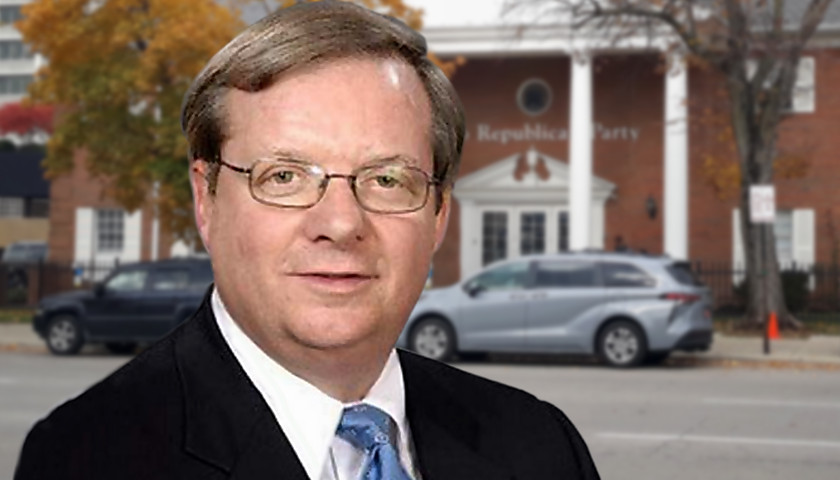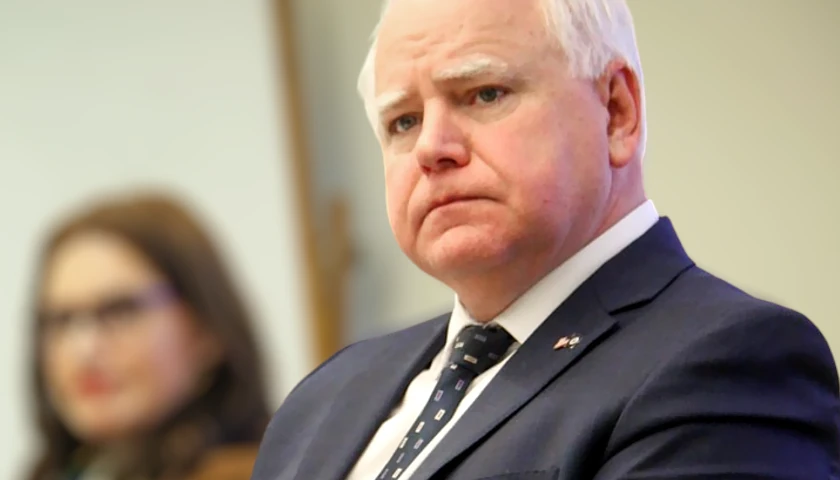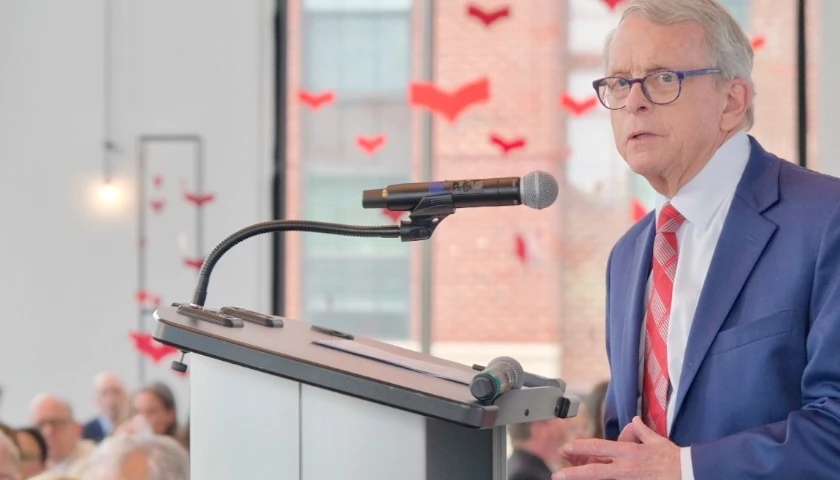The retired Ernst & Young partner and member of the Ohio Republican Party Central Committee responded to charges from the party chairman Robert A. Paduchik and his supporters that he is ignorant of non-profit accounting and that he delayed the resolution of the party’s books by forcing the party’s audit firm to resign.
“I’m an auditor in background, and when I’m an auditor, I want to get the facts. I want to understand what happened. I want to look at the dockets, or I want somebody else to look at them and tell me what happened,” said Mark A. Bainbridge, who represents the 16th Senate District on the Central Committee.
“I don’t want to speculate about what might have happened. I don’t know. I just want to know what the answer is,” he said. “There’s a $1.7 million adjustment to equity in 2017 and a $436,000 adjustment to equity in ’19, and equity doesn’t reconcile in 2021 by $270,000. I don’t know what those are. I want to know.”
Bainbridge and four other Central Committee members filed a November 29 lawsuit against Paduchik, Party Treasurer David W. Johnson and the Ohio Republican Party.
Paduchik unleashed his barrage of charges against Bainbridge in a November 30 open letter.
Bainbridge also dismissed Paduchik’s charge that he was working with The Committee for a Better Ohio, which the chairman claims is founded by dark money.
“As to Mr. Paduchik’s allegation of ‘dark money,’ we received no dark money for any purpose including the lawsuit. The funds we have used to pay for legal and media assistance has come
from about 10 members of the State Central Committee,” he said. “Our primary legal advisor and author of the lawsuit came from Mr. Dan Backer, an attorney from out of state. Mr. Robert Gargasz’s involvement was to file the lawsuit on our behalf.”
Bainbridge: ORP staffers told him Paduchik would not let them talk to him
“What happened is Bob Paduchik had introduced this kid, George Husted, to the group and told us that he was going to be helping with the books and records and that he worked for this firm. Well, everybody assumed it was a CPA firm, and it wasn’t. But anyhow, he did that,” he said.
“Then, later when Dave Johnson was making his report, I was asking Dave Johnson questions, and during that questioning, George Husted came forward and said: ‘I will be happy to meet with you or talk to you about any issues that you have on the financial statements,’ is what he said at the meeting, something like that, that’s not a quote, but that’s the essence,” he said.
“Paduchik was up there smiling and shaking his head, that this is what’s going to happen, but didn’t want to try to answer my question at the meeting,” he said. “You’ve got to remember that before that meeting, Paduchik would not allow the fiscal review committee to see the financial statements – that was the policy they’ve had for years, that two or three days before the State Central Committee meeting, the fiscal review committee gets together and reviews the financial statements so that we can ask questions and stuff on it,” he said.
Bainbridge said his issues go back quite a way, but he started asking questions about a $640,000 drop in the party’s equity in May.
“I had asked this question about the $640,000, and they didn’t want to answer my questions; they refused to have a meeting of the fiscal review committee before the meeting,” he said. “They just didn’t have one, so that was my only way to ask questions, so I don’t know if that’s probably too long of an answer, but that’s what really happened.”
Bainbridge said his next move was to reach out to the state party’s Executive Director Justin Bis.
“I called him first. He didn’t answer, so I sent him an email with a copy to Paduchik. I think I copied Paduchik. I can’t remember,” he said.
The certified public accountant asked Bis for balance sheet information, he said. “They put out a balance sheet that doesn’t balance because it doesn’t have the equity section, and I wanted the equity section.”
Bainbridge said he was looking for the documentation for the drop in equity from Dec. 31 to Aug. 31, and he was going to Bis. Still, the executive director referred him to a CPA working with the state party, George Husted, with no relation to Lt. Gov. Jon A. Husted.
“Justin said: ‘Well, I can’t help you with that. You’re going to have to talk to George. Here’s George’s email information. Email George, and he will get back to you with that information,’” he said. “I did that, and then I didn’t get follow-ups on either one. I called Justin back: ‘Well, I sent follow-up emails on both of them, which are in the exhibit, and never heard back, and then I called Justin and Justin said: ‘Well, you’re going to have to talk to Bob Paduchik. He’s not allowing us to provide any of that information to you, and Bob wants to talk to you.’”
Bainbridge said he called Paduchik three times and emailed him twice, but there was no response.
Bainbridge: Paduchik punished me for asking questions
The former Ernst & Young partner said instead of Paduchik helping him understand the discrepancies in the books, the Ohio Republican Party chairman retaliated against him.
“I’m on the fiscal review committee, so what’s he do? He kicks me off – and I’m the only person on the board, to be honest with you, I mean, I truly am the only person on the board that understands any of this stuff – and that’s just the truth,” he said.
When Paduchik and his supporters push back at Bainbridge, one of the points they make is that he is not familiar and confused with the unique bookkeeping for a political party, as opposed to the accounting Bainbridge practices with companies.
Bainbridge said this is absurd.
“No, I’m not confused at all, and I do understand the difference between auditing the Ohio Republican Party and General Electric,” he said.
“In my career, I audited some of the biggest not-for-profit organizations in the state of Ohio, all of which you would immediately recognize if I said their name, so I understand how not-for-profit works,” he said.
The CPA said this was one of his specialties during more than 40 years of his professional life.
“I have a lot of understanding of not-for-profit governance. I used to consult with my clients about improving their not-for-profit governance,” he said.
The essential thing to know about governance is that you have to follow an organization’s bylaws, he said. “Now, our bylaws are horrible, but you still have to follow them because they give all this power to the chairman.”
Bainbridge said it is common for members of many oversight boards to go along with an organization’s leadership, which leads to problems. “They don’t want to have an oversight role, and that’s the board’s role.”
Bainbridge: I did not cause CLA to resign the party’s account
Bainbridge said that he convinced then-Party Chairwoman Jane E. Timken that it was necessary to fix the books in December of last year.
As the man taking the lead in the project, Bainbridge wrote a request for proposals to firms that might be interested in fixing the party’s books, he said.
“I came up with the names in December of 2020 because I’d been badgering Jane: ‘Jane, we need to have an audit here,'” he said.
Driving him to push for the audit was a report commissioned by the party, which read the party’s financial statements were in shambles, he said.
“I read that; I said: ‘Jane, I am not going to be on the Audit Committee. This report is so devastating.’ The reports to the Federal Election Commission, the State Auditor, or the Secretary of State. I mean, you should read this thing. It’s ridiculous,” he said.
To his surprise, Timken gave the project to an accounting firm, which was not on the list, the CliftonLarsonAllen (CLA) office in Canton, Ohio, he said.
The Ohio Republican Party engaged CLA April 5, but the firm resigned from the account Sept. 1.
When Bainbridge asked Greg Blasiman, the office principal leading the work for the party, how CLA came to hear of the project, since they were not sent a request for proposal, he said Blasiman told him that he was tipped off by the office’s tax section, where people there work on Timken family and business accounts.
Despite what he saw as a significant conflict of interest, Bainbridge said he accepted CLA as the firm to do the job. Consistent with his professional ethos, he called Blasiman to help him understand the depth of the challenges as a matter of professional courtesy.
“Well, I wasn’t trying to have a professional relationship with Greg,” he said. “Under professional courtesy, I wanted him to understand. If I was Greg and a CPA and I was auditing the Ohio Republican Party, I would want to understand some of the things that I discovered in the financial statements, like the fact that the equity sections don’t progress.”
He said that an entry for $1.7 million was not resolved, and unexplained decreases in equity, which is simply the difference between assets and liabilities.
“I wanted him to understand this whole receivable write off thing because these receivables were on the books for four years and the number hadn’t changed, and he was auditing some of these periods and needed to go back and figure out what the heck this stuff was,” he said.
Bainbridge said in addition to phone calls with Blasiman; he had Zoom calls with him and his team. At least twice, they were joined by Laura Rosenberger, a Central Committee member then-serving on the Audit Subcommittee, but since removed by Paduchik.
“They were taking notes, and they asked me to send them all this information,” he said. “They wanted to see it, and under Generally Accepted Auditing Standards that CPAs have to follow, and that’s different than General Accepted Accounting Principles,” he said.
The GAAS requires the CPA to hear out anyone who might have information to help him understand an organization’s policies and procedures, he said. “Under Generally Accepted Auditing Standards,” he’s required to listen to anybody, particularly a board member that has concerns about the books and records. He’s auditing management for the board. He works for the board, and obviously, he wants to do a good audit.”
In fact, the word “auditor” means one who listens, he said.
One relates to what’s in the financials. The other relates to how you do an audit.
Bainbridge: CPA’s work for the governance board, not an organization’s leadership
“They call them certified public accountants, and they have a significantly different responsibility than a lawyer or an engineer or something that just works for management,” he said.
“The CPA works for the board; when they put out an audit report, it’s going out,” he said. “Banks, anybody can see that report. They have a responsibility to the public to make sure that they do a good job and the financial statements conform with generally accepted accounting principles, so the only way they can do that is to count on people inside and others and encourage people to call them.”
Given that the auditors should not report to the party chairman, Bainbridge said he was surprised when he heard that Blasiman was talking to Paduchik, he said.
“I don’t know why Greg felt it important to tell about the Bob Paduchik that I called him, but he did, and he’s probably not dealt with a lot of audit stuff,” he said.
“The audits he does are probably pretty small and probably pretty straightforward, but this is an organization that has very screwed up books and records,” Bainbridge said.
Bainbridge: I do not know of any illegal acts and or transfers of funds
Bainbridge said that as he tried to find explanations for unaccounted funds, Puduchik has worked to thwart him.
“The only thing we’ve been doing is getting blocked by Bob Paduchik from doing anything and been calling names that we’re trying to destroy the party,” he said.
“That really, this whole thing bothers me that Paduchik and many members of the State Central Committee, the political people, want to see these significant financial issues just go away and not be addressed,” he said.
“I am not an ideologue or have any horses in the races in the upcoming 2022 elections,” he said.
“It’s about being accountable versus unanswerable to the voters, about having integrity versus being dishonest.”
– – –
Neil W. McCabe is the national political editor of The Star News Network. Follow him on Twitter: neilwmccabe2.





